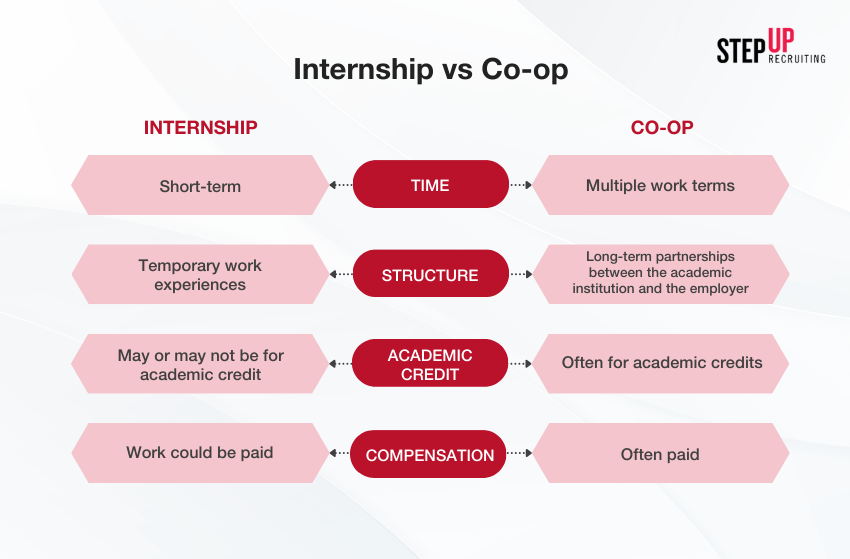What’s the Difference Between a Co-op and an Internship?
A great way to get work experience is through a co-op or an internship. The terms are often used interchangeably, but there are some differences. However, the main difference between Co-op and an Internship is time.
Time
Internships are usually short-term and are worked full-time over the summer.
Typically, co-ops tend to require full-time employment over the course of the semester and can last multiple work terms, anywhere from 3 to 12 months.
Other differences between co-op and internships:
1. Purpose
Internships offer students the possibility to explore any career path they want. Including fields different from their major.
The purpose of a co-op placement is for the student to explore a position they might want to pursue after graduation.
(Learn how to get an internship).
2. Structure
More often than not, internships focus on one project or task. Students are assigned specific roles and responsibilities. Internship programs can offer students more flexibility. They also allow participants to keep taking classes while continuing to attend school. An internship allows students to explore different work cultures helping them determine if they’ve chosen the right field.
In contrast, Co-op students often work in a variety of roles and new responsibilities over time since Co-ops tend to be long-term programs. Students involved with co-ops often have their academic life extended. Co-ops usually last anywhere from 3 to 12 months, and students do not take classes during this time. Universities with co-op programs often require students to complete at least two sessions.
Co-ops offer students in-depth and extensive work experience while giving them an edge over peers when it comes to employment experience.
3. Academic Credit
Students can pursue internships as a requirement of an academic program. Also, students can find internship opportunities on their own to get credit for their experience.
Co-op programs are often pursued to obtain academic credit. Another advantage of a co-op program is that students can earn work experience and academic credit.
4. Remuneration
Internships can be paid or unpaid. When they are paid, they usually offer a small stipend. But this isn’t always the case.
Co-op programs pay students. Actually, one of the main requirements for co-op programs is to give compensation to students for their work.
Choose what’s right for you.
The major difference between a co-op and an internship is the amount of time you spend working during the process. Either program can benefit a student seeking to gain experience prior to graduating from college. And both give you a competitive edge that other new graduates may not have when it comes to applying for jobs. Also, consider how many projects you would like to work on. Finally, don’t overlook needing extra money for your expenses. Weigh all these considerations before making a decision.
List of Engineering Scholarships
StepUp Recruiting has a wide range of contacts throughout the professional world. If you’re looking for a co-op or an internship in any of the industries we support, reach out!




